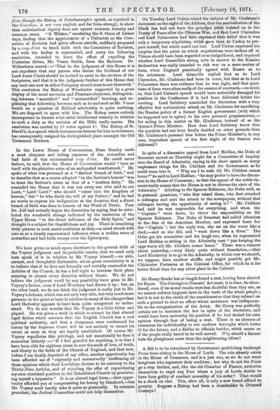On Tuesday Lord Cairns raised the subject of Mr. Gladstone's
statement on the night of the Address, that the neutralization of the Black Sea had not been the principal point insisted on in the Treaty of Peace after the Gritneati War, and that Lord Clarendon and Lord Palmerston had both expressed their belief that it was only a temporary stipulation, which gave time to Turkey to pre- pare herself, but which could not last. Lord Cairns expressed his surprise that the point on which negotiations were broken off at Vienna should have been regarded as so insignificant, and inquired whether Lord Granville's strong note in answer to the Russian, declaration was really intended to risk war on a mere matter of form, when England practically agreed with Russia as to‘ the substance. Lord Granville replied that as to Lord. Clarendon, Mr. Gladstone had been in error, but that as to Lord. Palmerston there was evidence that he was right, and that ques- tions of form were often really of the essence of contracts,—so much so, that Lord Cairns's speech would have materially damaged his. position in the Conference if it had been delivered before the meeting. Lord Salisbury concluded the discussion with a very effective but acrimonious attack on Mr. Gladstone for sacrificing the Russian policy of a former English government (with which he happened not to agree) to his own personal prepossessions,-- for acting in this matter as Mr. Gladstone, instead of as the Queen's Prime Minister. How does Lord Salisbury know that the question had not been finally decided on other grounds than Mr. Gladstone's personal bias before the Prime Minister's, in any case, imprudent speech of the first night of the Session was- delivered ?


































 Previous page
Previous page